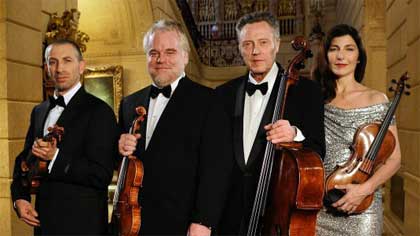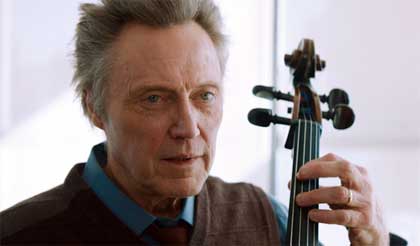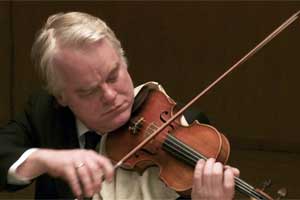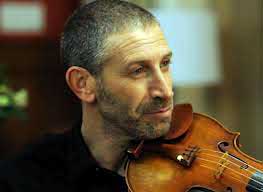Film (2012)
Directed by Yaron Zilberman
Written by Seth Grossman and Yaron Zilberman
Cinematography: Frederick Elmes, Film Editing: Yuval Shar
With Christopher Walken (Peter Mitchell), Philip Seymour Hoffman (Robert Gelbart), Imogen Poots (Alexandra Gelbart), Catherine Keener (Juliette Gelbart), Wallace Shawn (Gideon Rosen), Mark Ivanir (Daniel Lerner), Liraz Charhi (Pilar)

Philip Seymour Hoffman (Robert Gelbart)
Christopher Walken (Peter Mitchell)
Katherine Keener (Juliette Gelbart)
in “A Late Quartet”
Peter Mitchell (Christopher Walken) is the cellist in the noted Fugue Quartet. Having noticed difficulties in playing, he goes to the doctor and discovers something that explains it. This gives rise to turbulence among the members of the Fugue. Each of them is passionate about their quartet, but some of them also carry heavy emotional agendas built over a long history with it.
Beethoven’s late, great quartet, Op. 131 in C sharp minor, provides the structural and metaphoric backbone of the film. It is a remarkable piece of music, and one has the feeling that its sheer grandeur and mystery might have given writer-director Yaron Zilberman the inspiration for the story. Hearing it, and seeing it form the fulcrum for this drama, is a pleasure it itself.

in “A Late Quartet”
There are many reasons why I wanted to like this film.
That Beethoven C-sharp minor quartet is one of my favorites. When I was in college I used to sit and listen to the Guarneri Quartet’s recording of it over and over, and it has been a favorite ever since. I am fascinated by the dynamics of long-lived chamber music groups and often wonder how they manage it, and have been drawn to intimate portrayals of them, like that of the Guarneri Quartet’s first violinist, Arnold Steinhardt, Indivisible By Four.
The principal actors in the film are noted and very good ones. Philip Seymour Hoffman, in particular, is a magisterially versatile actor and seems to be able to make any script function even better. Christopher Walken and Catherine Keener also have justifiably respected reputations.

in “A Late Quartet”
Given all of these sources of interest, I looked to this film for an abundance of satisfactions. But, early on, I began to find the script and the directing somehow off the mark.
There is much too much contrived melodrama in this story for it to be believable. The network of involvements, and the consequences of them, is just too crazy. Something more subtle, with overtones along the same lines, would have been powerful and interesting. But, as told, this just came across as a kind of Peyton Place (1964-1969, the first long-lived prime time TV soap opera) for the classical music set.

in “A Late Quartet”
There are long closeup scenes of the actors pretending to play their instruments, and that just does not pan out very well either. A few seconds here or there with mismatched sound and visual movement would have been fine. But these scenes go on for minutes at a time and it is painful to watch.
The acting is okay, though not generally great, and I assume that the limitations fall within the director’s hands.
Hoffman, who is always good, is pretty good here, but even he cannot redeem things. Walken is sympathetically magisterial, uncharacteristically paternal and, unlike many of his typecast roles, sane. And Keenan is okay, but seems caught in the crossfire. Mark Ivanir, less well known, has a kind of attractive intensity, especially early on. But when the plot causes him to run into unlikely obstructions, his performance too comes crashing down with the scenery.

in “A Late Quartet”
There is a perfectly ridiculous scene in which Alexandra Gelbart (Imogen Poots), the daughter of Robert and Juliette, is caught unawares in her apartment by her mother. Alexandra’s response is so weirdly amused it does not seem to be in keeping with any vision or tone of the script.
The consequences of action in the film are unexplained, but we are left at the end with yet another performance that is supposed to embody significance and drama.
Wallace Shawn makes a little appearance as a member of another chamber group. It is nice to catch sight of him again, though we do not get much.
The New Repertory Theatre produced a wonderful play about a string quartet a few seasons ago. Entitled Opus, it was complex, subtle and moving. A string quartet is a rich arena for dramatic exploration, and when that is done well it can provide a wonderful theatrical result.
– BADMan
Leave a Reply